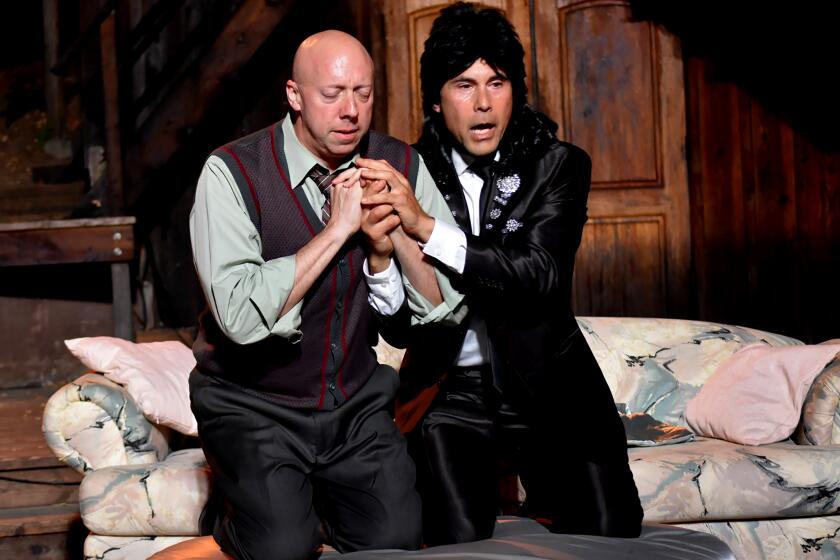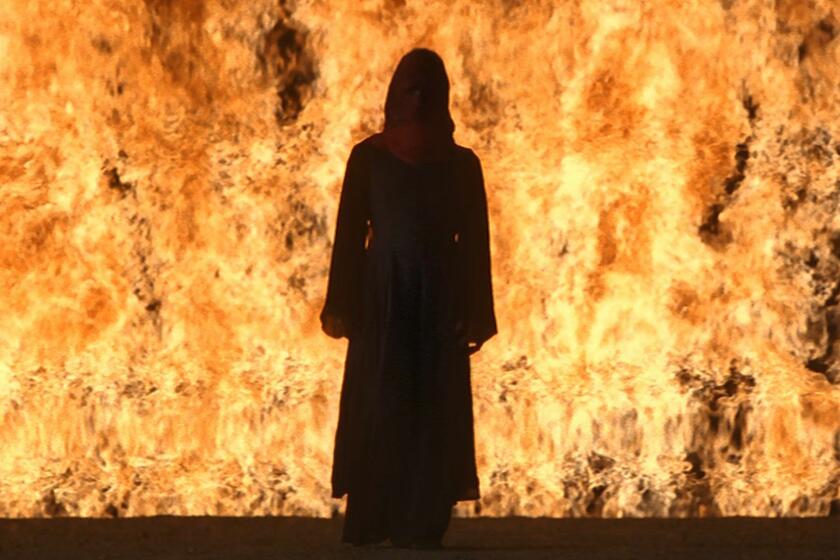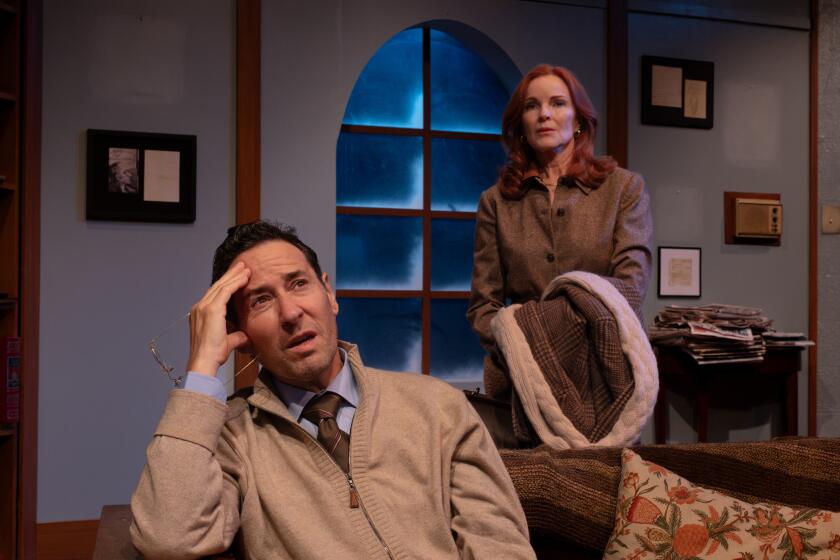For Want of a Hero
A trip to Franklin Delano Roosevelt’s home at Hyde Park, N.Y., stirs both pride and puzzlement. The pride comes in feeling some contact with an American who endured debilitating hardship and then stirred himself--and the nation--to perform extraordinary feats. The puzzlement comes in two forms. Though Roosevelt was, by any definition, to the manor born, his residence (like the museum nearby built in his honor) seems remarkably unpretentious, a real house in which real people actually lived. In one corner of the heavily draped living room is the table at which Roosevelt noodled around with his stamp collection; the guest quarters and Roosevelt’s bedroom are tasteful in the Victorian manner but hardly sumptuous: In all, this is the residence of a confidently homey country squire. Compared with any number of robber barons’ mansions and presidential library sites--from the Vanderbilt estate down the road in Hyde Park to the Ronald Reagan Library in Simi Valley--Roosevelt’s place is downright simple, and these days that comes as a surprise.
The second puzzlement has to do, paradoxically, with Roosevelt’s genuinely heroic image amid the lack of imperial grandeur. All around, in the clutter of old Navy prints and family bric-a-brac, there are silent reminders of the adversities he overcame, none more poignant than a pair of empty wheelchairs. There are reminders of his great accomplishments amid the Great Depression and World War II: drafts of major speeches, letters from poor but encouraged ordinary citizens, an exhibit reconstructing the White House’s secret war room.
There are reminders of other larger-than-life characters, ranging from Eleanor Roosevelt (who gets a room of her own at the museum) to Winston Churchill to Josef Stalin, for good and for evil, an impressive group. There is only one jarring intrusion of contemporary life: a photograph commemorating President Bill Clinton’s summit with Russian President Boris N. Yeltsin at Hyde Park in 1995. Coiffed, tailored and puffed up as both men are, they look like pygmies beside the departed greats.
Where are the public heroes of yesteryear? The question has haunted succeeding generations of Americans. Among those who came of age around the year 1800, there was palpable anxiety about their inability to live up to the example of their fathers, who had won the Revolution and ratified the U.S. Constitution. At the end of the 19th century, the sons and daughters of the Civil War generation faced similar fears of an impending decline into complacency and enervation. Today, Americans under 50 look back at their parents and the rest of the heroic cohort that battled the Depression, defeated fascism, secured civil rights--”the civic generation,” as the political theorist Robert D. Putnam calls it--and we start to worry about ourselves.
Yes, we have produced film stars and rock stars and sports stars galore, and paid them handsomely in money and adulation. Our generation can honestly boast of advancing cultural revolutions that have widened opportunities for women and minorities. But, so far, our poll-driven, television-obsessed public leaders--Clinton, Al Gore, Dan Quayle, Newt Gingrich--have appeared less than heroic and more than a bit craven. It’s as if the creepy self-promoters of our high-school days--the cunning but oh-so-earnest class presidents, the charming, unserious rich kids, the stolid, careerist resume-builders--have seized state power. Has the dazzle of mere celebrity finally overtaken more rugged and inspiring public virtues? Have our public leaders become spiritually timid and lackluster? Has the capacity for bold leadership--what Quayle’s mentor, George Bush, cynically called “the vision thing”--been purged from public life and monopolized by brilliant capitalist nerds like Bill Gates?
The worries may prove, in time, to be completely misplaced. The generation that followed the Revolution, after all, produced an abundance of public heroes suited to every political persuasion: William Lloyd Garrison and Sojourner Truth, Andrew Jackson and Henry Clay, Daniel Webster and John C. Calhoun. As the smug excesses of the Gilded Age mounted in the 1880s and 1890s, such figures as Theodore Roosevelt, Woodrow Wilson, Eugene V. Debs, W.E.B. Du Bois and Harriot Stanton Blatch were preparing to clamber onto the national stage. It is possible that their like will turn up again in the years to come, among baby boomers or Gen-Xers.
Still, there are reasons for concern. Previously, despite various ills attendant to U.S. politics, there survived an ideal that public service was a noble calling, that the right man or woman in the right place could make a world of difference. Today, those ills--legislative log-rolling, campaign-finance payoffs, media manipulation--no longer seem merely attendant and correctable but endemic to the system, and dissuade idealists. Our fixation, born of television, on campaigners’ style, congenial looks and ad-style sound bites has deepened. Could ugly, eloquent Abraham Lincoln, whose prose style was biblical and not cleverly commercial, be elected president today?
Meanwhile, the general public’s interest in politics, as measured by steadily declining election turnout, has vastly eroded. A curious convergence of ‘60s-vintage rebelliousness, suburban libertarianism, reactionary populism and Gordon Gekko-style selfishness has encouraged a widespread distrust of our political institutions and those who run them. Bob Dylan’s old antiauthoritarian line--”Don’t follow leaders, watch the parking meters”--seems to have been transformed into a political watchword for the left, right and center alike.
Those of us older than 45 can remember being touched 30 years ago by leaders such as Martin Luther King Jr. and Robert F. Kennedy--only to see those heroes gunned down, their hopes turned to lasting embitterment. Younger Americans remember the paradoxical Ronald Reagan as the closest approximation they have known to a national political hero: a media-savvy rhetorical leader whose words encouraged oppressed dissidents in the Soviet Union (but not in South Africa); who attacked big government (but helped plunge the federal government into trillions of dollars of debt), and whose administration stood up for law and order (but in the Irangate proceedings played fast and loose with the U.S. Constitution).
There is, of course, an old individualist strain in American life, one which Reagan, in yet another paradox, exploited brilliantly, that looks for heroes in intimate surroundings, and not in great national struggles. “Each man is a hero and an oracle to somebody,” Ralph Waldo Emerson wrote a century and a half ago. Although Emerson would find national figures to admire during the Civil War, later (and lesser) minds have twisted his insight into a sentimental evocation of down-home, usually voluntary acts of valor and virtue (Bush’s famous “thousand points of light”) as a laissez-faire alternative to government activism.
Yet, historically, Americans have felt a perennial need for national political heroes to guide them through critical times as well as to vindicate a sense of shared political commitment. The fears return: Are such incipient heroes out there today? If there are, will they be recognized, and can they make a difference, in today’s political climate?
History can, of course, teach a great deal in this connection. The purpose behind learning about America’s past great white men (and great nonwhite men, and great women of all colors) is not, as some would have it, to inculcate a mindless patriotism, but to understand what heroism can mean in a national context.
Nor is the current political scene totally bereft of authentic political heroes. Take, for example, Rep. John Lewis of Georgia. As a young student leader in the civil-rights movement, Lewis displayed valor worthy of a Congressional Medal of Honor, braving scores of arrests and numerous beatings in nonviolent protests against segregation. As a politician, he has stuck by his old principles, granting nothing to the more fashionable voices of racial nationalism, on the one side, or of retreat from reform, on the other. An outspoken liberal, he nonetheless is regarded with respect, even awe, by his political adversaries in Washington. He has neither movie-star looks nor telegenic affability--but he has brains, fortitude and courage, along with an unclouded vision of an America unburdened by race.
History also teaches that heroic leaders do not simply manufacture themselves, but appear in troubled times and meet the challenges of those times. Lincoln might well have remained a minor Illinois politician and successful railroad lawyer had the slavery controversy not flared up in the 1850s. Franklin Roosevelt had ebullience, energy and stamina when he entered the White House in 1932; greatness came later. King was a pampered Morehouse College man, an eloquent preacher and an undiscovered plagiarist, until history beckoned to him during a Montgomery bus boycott in 1955.
Though we have our share of problems, no such troubles or moral crises appear on the horizon just now. To reverse the old Chinese curse, we are blessed to be living in uninteresting times. And so, perhaps, we are getting leaders suited to those times. But times change, and one wonders whether our store of heroic leadership can be replenished: whether our politics can still produce figures who can convince themselves, let alone the nation, that finally they have nothing to fear but fear itself.
More grievously, one wonders whether, after so much cynicism and glitz, the public could even accept such leaders. To be sure, the country still has the capacity to unite in times of brief, alarming crisis: during Bush’s Persian Gulf War, for example, or following the bombing of the federal building in Oklahoma City (which may have provided Clinton with his presidency’s greatest moment of moral leadership). But who’s to say that this would hold true over the long haul, amid troubles that do not end so fast, like the Great Depression or the Second World War? Who’s to say that even Roosevelt himself could have led our jaded body politic through the sorts of crusades some of us look back on now with nostalgia?
More to Read
The biggest entertainment stories
Get our big stories about Hollywood, film, television, music, arts, culture and more right in your inbox as soon as they publish.
You may occasionally receive promotional content from the Los Angeles Times.






